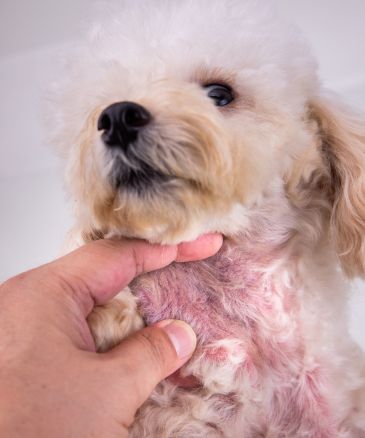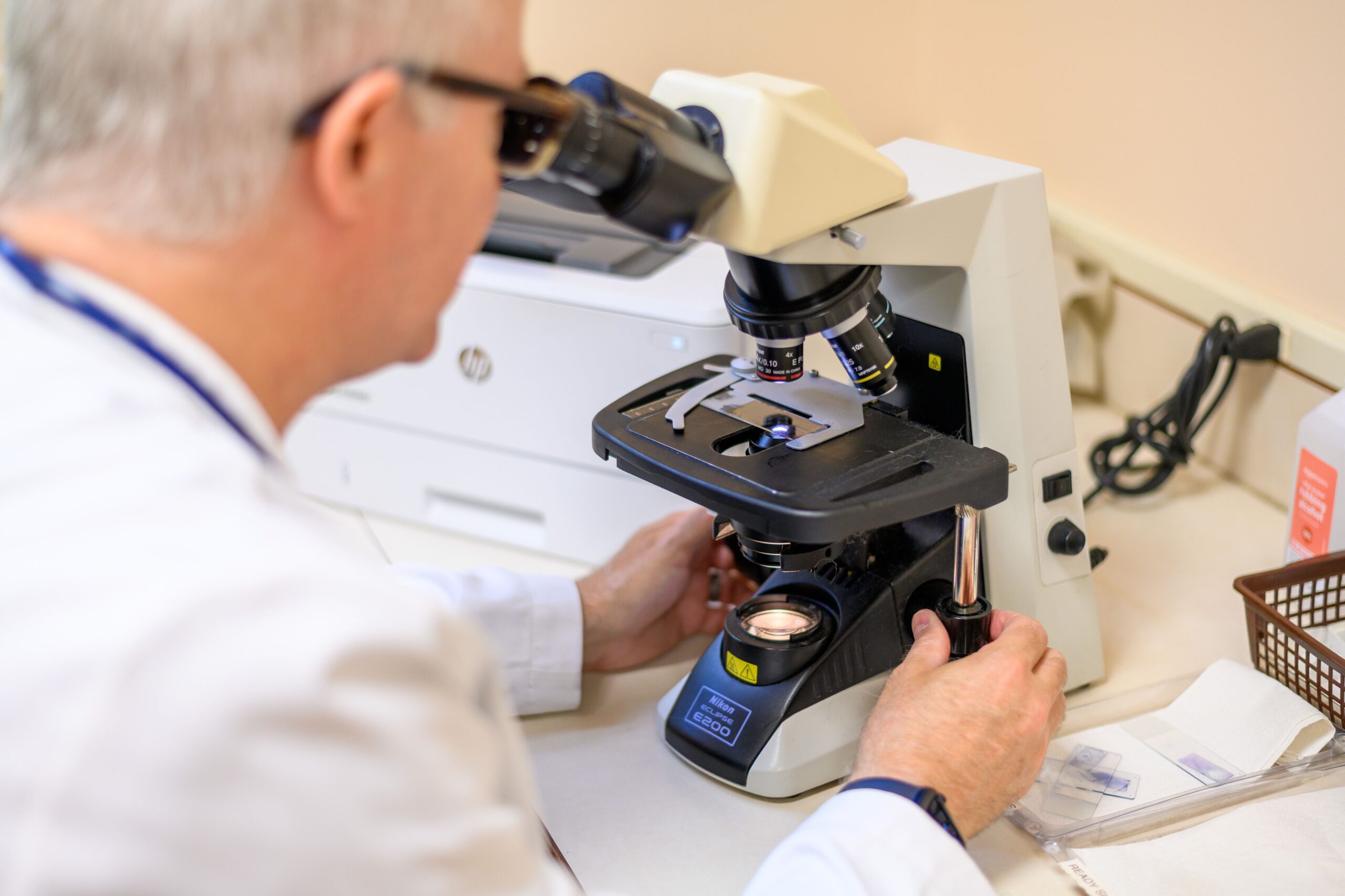Pet Dermatology
Learn more about our pet dermatology services below.
Dermatology Care for Your Pets at Brookfield Animal Hospital
Dermatological issues in pets can manifest for many reasons, impacting their skin, fur, and overall comfort. One prevalent factor is allergies, which can be triggered by various sources such as certain foods, environmental factors like pollen or dust mites, or even contact with specific materials. Parasites, such as fleas, ticks, and mites, are common culprits, causing itching, redness, and inflammation. Bacterial or fungal infections are another significant concern; warm and humid environments can facilitate their growth, leading to skin problems. Hormonal imbalances, like thyroid disorders or Cushing’s disease, can manifest in skin changes, including hair loss and thickened skin. Autoimmune disorders can also affect pets, where the immune system mistakenly targets the skin cells, resulting in various skin diseases. Additionally, poor nutrition can lead to coat and skin problems, emphasizing the importance of a balanced diet.
Derm cases we diagnose and treat:
- Environmental allergies (atopy)
- Food allergies
- Bacterial and yeast skin infections
- Parasitic skin infections
- Immune-mediated skin disease
- Benign and cancerous skin growths
We utilize multiple diagnostic tools to diagnose your pet including:
- Skin cytology
- Skin scraping
- Skin culture
- In-office skin biopsy
- Surgical biopsy
Dermatology Care for Your Pets at Brookfield Animal Hospital
Dermatological issues in pets can manifest for many reasons, impacting their skin, fur, and overall comfort. One prevalent factor is allergies, which can be triggered by various sources such as certain foods, environmental factors like pollen or dust mites, or even contact with specific materials. Parasites, such as fleas, ticks, and mites, are common culprits, causing itching, redness, and inflammation. Bacterial or fungal infections are another significant concern; warm and humid environments can facilitate their growth, leading to skin problems. Hormonal imbalances, like thyroid disorders or Cushing’s disease, can manifest in skin changes, including hair loss and thickened skin. Autoimmune disorders can also affect pets, where the immune system mistakenly targets the skin cells, resulting in various skin diseases. Additionally, poor nutrition can lead to coat and skin problems, emphasizing the importance of a balanced diet.
Derm cases we diagnose and treat:
- Environmental allergies (atopy)
- Food allergies
- Bacterial and yeast skin infections
- Parasitic skin infections
- Immune-mediated skin disease
- Benign and cancerous skin growths
We utilize multiple diagnostic tools to diagnose your pet including:
- Skin cytology
- Skin scraping
- Skin culture
- In-office skin biopsy
- Surgical biopsy
It’s important to be vigilant for signs and symptoms that may indicate a problem with your pet’s skin or fur. Common symptoms to look out for include:
- Itching and Scratching: Persistent scratching, licking, or chewing of the skin or fur.
- Redness and Inflammation: Visible redness, swelling, or irritation of the skin.
- Hair Loss: Patchy hair loss or bald spots, which can indicate localized infections or underlying issues.
- Rashes or Hives: Raised, itchy bumps or hives on the skin.
- Scabs or Crusts: The presence of scabs, crusts, or open sores on the skin.
- Changes in Skin Color: Unusual changes in skin pigmentation, such as darkening or lightening.
- Lumps and Bumps: The appearance of new growths or lumps under the skin.
- Excessive Grooming: If your pet is constantly grooming a particular area, it may indicate discomfort or irritation.
- Ear Infections: Frequent shaking of the head, scratching at the ears, or a foul odor from the ears can be signs of ear infections, which are often related to dermatological issues.
- Paw Licking and Chewing: Excessive licking or chewing of the paws can signal skin problems, allergies, or irritation.
(this is not an exclusive list, merely a starting point)
Dermatological cases in pets can have a variety of underlying causes, such as:
- Food allergies
- Environmental allergies
- Parasites
- Bacterial skin infections (pyoderma)
- Fungal skin infections (ringworm, yeast infections)
- Viral infections (e.g., papillomavirus)
- Autoimmune Disorders
- Endocrine Disorders
- Testosterone-related skin issues in male dogs
- Poor nutrition
- Adverse reactions to medications
- Sunburn
- Excessive licking, chewing, or self-trauma due to stress
- Wounds, burns, or abrasions
- Skin tumors, benign or malignant
- Ear Problems
- Age-Related Changes
The Power of Dermatology: Transforming Your Pet’s Life
Pet dermatological conditions can be upsetting for both your furry friend and you, their devoted owner. Our cutting-edge dermatology services are intended to address a variety of issues with the skin and coat, from allergies and infections to chronic diseases. Discover the advantages of bringing your pet to Brookfield Animal Hospital:
Customized Treatment: Pets are unique, and their dermatological needs vary. We provide personalized treatment plans tailored to your pet’s specific condition, ensuring the best possible outcome.
Relief from Discomfort: Dermatological issues can cause itching, pain, and discomfort for your pet. Our goal is to alleviate their suffering and improve their quality of life. Say goodbye to sleepless nights and constant scratching.
Comprehensive Diagnosis: Our state-of-the-art diagnostic tools enable us to pinpoint the root causes of your pet’s skin issues. From skin scrapings to allergy testing, we leave no stone unturned in our quest for answers.
Preventive Strategies: Beyond treatment, we equip you with the knowledge and tools to prevent future dermatological problems. It’s all about keeping your pet happy and healthy in the long term.


